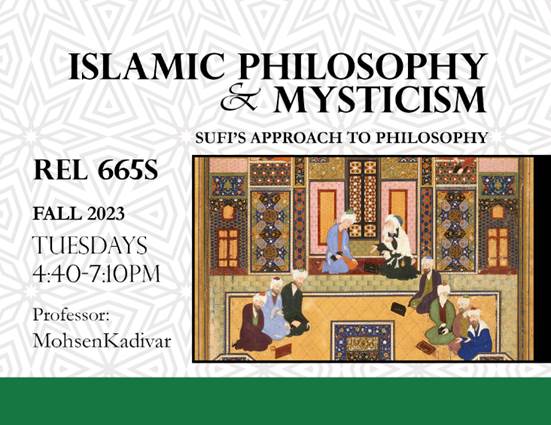
RELIGION 665S
Islamic Philosophy and Mysticism
(Sufi’s Approach to Philosophy)
Instructor: Professor Mohsen Kadivar
Fall 2023
Tuesdays, 4:40-7:10 PM, Venue: Gray 319
There are three major schools in Islamic philosophy: Peripatetic Philosophy (Alfarabi and Avicenna), Philosophy of Illumination (Suhrawardi), and Transcendent Philosophy (Mulla Sadra). The former is Aristotelian, and the others are close to Sufism. This course focuses on Sufi’s approach to Philosophy, especially on the Philosophy of Illumination of Suhrawardi (1155-1191) and The Transcendent Philosophyof Mulla Sadra(1572-1640).
The course starts with an introduction to the philosophy of Suhrawardi, and Mulla Sadra as well as the mystical works of Avicenna, al-Gazali, and Ibn Tufail. The main body of the course is studying and analyzing symbolic and mystical recitals of Avicenna, Suhrawardi, Gazali, Ibn Tufail, and others. We try to examine the key themes of philosophy, Sufism, and philosophical Sufism through these symbolic and mystical recitals.
Central themes of philosophy: ontology, existence and essence, being and quiddity, the ground of reality, quiddity as an illusion, necessary and contingent beings, limit and infinity, substantial motion, the ground of motion, temporal origination and eternity, God’s existence, His Oneness, His attributes, Divine knowledge, Divine will, free will, self-body problem, life after death, psychology, scatology, the soul and resurrection, and Hikmat.
Key points of practical Sufism: nature of the man, asceticism, unity, final abode, Sufi’s style of life, and four spiritual journeys.
Main issues of philosophical Sufism: light and varieties, angelology, the archetypal world: Mundus Imaginalis, vision and intellect, knowledge and presence, knowledge through innate ideas, knowledge by presence, the hierarchy of knowledge, the modulation of being, the semantics of the modulation of being, mental being, reality and the circle of being, diversity in unity and unity in diversity, the unity of the knower and the known, unity of existence, salvation.

